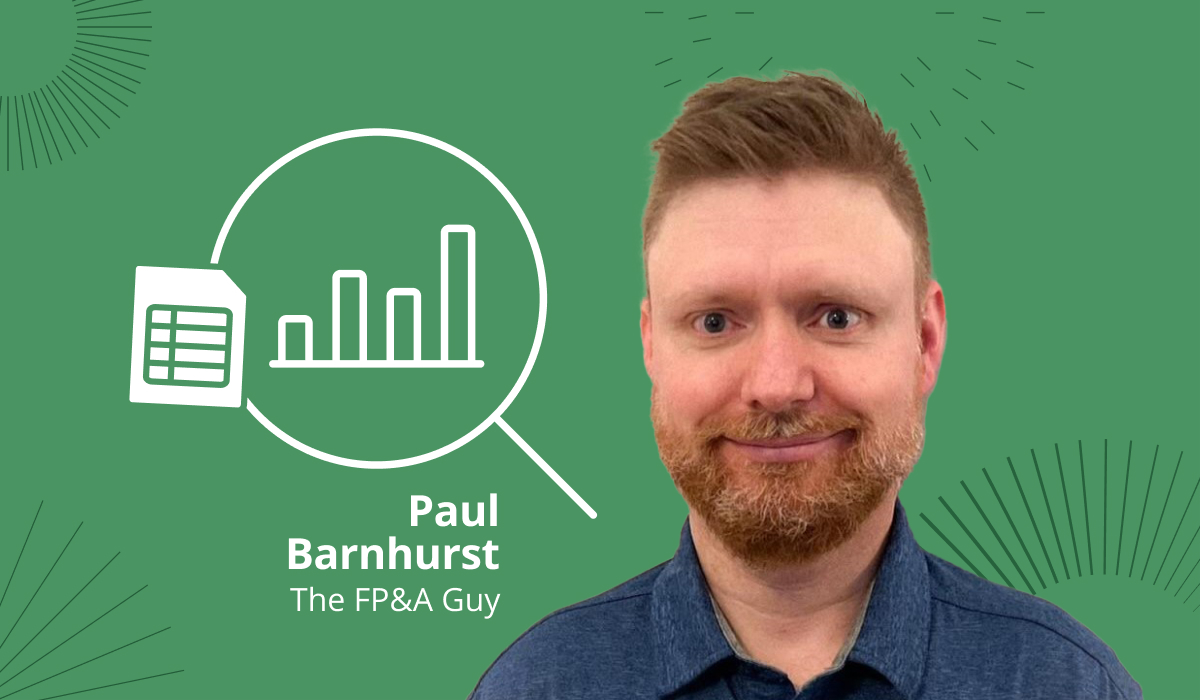
You probably know him as "The FP&A Guy." For years, Paul Barnhurst has been a leader, influencer and educator in the FP&A community. Ahead of his two sessions at Excelerate =SUM(it) 2022--one on financial modeling, the other on contemporary skills--we sat down with Paul to chat.
We discussed Microsoft Excel, how he cultivated a community of FP&A professionals on LinkedIn by sharing his own insights and best practices and where he believes the future of FP&A is heading.
Here's part one of our two-part interview with Paul Barnhurst, "The FP&A Guy."
Paul Barnhurst: The first time I used Excel professionally would have been before I was working in FP&A in the early 2000s. I started my career with the government as a Contracts Specialist, so we'd receive financial proposals through Excel and have to review them. I still remember relatively early on in my career while I was still learning Excel, my boss said, "I've heard these pivot tables are cool." This was probably around 2004.
I had no idea how to use pivot tables at the time and had to figure everything out for myself. I'd find myself putting all the text data into the pivot table and wondering why it wasn't providing useful information. Those are probably some of my earliest experiences with Excel.
PB: I never set out to work in FP&A. After I worked for the government for a little while, I quickly realized that writing government contracts wasn't the right career for me. There's a lot of red tape and regulations and it just wasn't a great fit. I ended up moving over to our systems office and went back to grad school. I was doing an MBA. I had planned on studying Supply Chain and doing a double Master's in Information Management. However, I took a Finance class and really liked it, so I went on to take advanced classes.
I talked to the professor and ended up switching to do a Finance specialization in Supply Chain. At the time, I was thinking of possibly trying to do something in investment banking, but I completed grad school in 2008 and it wasn't the best time to try and break into investment banking--back then, all they were doing was shedding jobs.
I ended up going to work for American Express, starting out as a hybrid business/finance analyst. I did a lot of report writing work, worked with SQL. I also managed a cashflow forecast that supported our FP&A team. From there, I got the opportunity to work with the FP&A team at American Express and I've essentially been working in FP&A ever since. I worked for American Express in FP&A for about eight years, starting as a Finance Analyst and then moved on to a company called Solera for five years. I'm currently in the process of starting my own business.
PB: The part I enjoy most about FP&A is really the "business" element. In my last role, I was given the opportunity to partner a lot with go-to-market, marketing and sales teams which I loved. I did a lot of things that fell under sales ops in addition to FP&A--but that strategic planning element and helping the business achieve its objectives by providing insights as a key partner to the organization are some of the things I enjoy most about FP&A.
Also, digging in and providing analysis and value-added insights so that [cross-functional departments] can really have those insights that they need--those are the things I really like about FP&A.
PB: It really just happened by what I call "dumb luck," so to speak, while looking for a job. A lot of people start with LinkedIn when looking for a job. While on LInkedIn I ran across a guy by the name of Ken Fick who runs his own business and a website, FPAexperts.com. And I reached out to him saying, 'Hey, would you give me 15-30 minutes of your time? I'll buy you a Starbucks gift card and we can have a virtual meeting. I'd like to get some career advice as I'm looking for a job.' And he responds back with, 'I'd be happy to meet with you, but I don't want a gift card. I want you to write an article for my website.'
I was initially skeptical as I thought I'm a terrible writer, but fine--I'll do it. Maybe it'll be a good experience. So I wrote my first article for him and it was horrible. It was on BI and probably a couple of pages long, but he liked it and was like, 'Hey, will you do a couple more for me?' And so I did--I think I did two more for him before I just got too busy. I did a little bit more on LinkedIn and that got me started with writing.

Later on, I decided to become even more active as I was looking for new career opportunities and I started to find that I liked [writing] the more I did it. It was fun to comment back and forth with people. I got some opportunities to be on some webinars for FP&A Trends, wrote an article for them, did an article on financial modeling with someone out of Australia and Anders Liu-Lindberg reached out and asked me to do something and it kind of just started to build. I found myself moderating one of the largest FP&A forums on LinkedIn. And then after that, I was like, 'There's something to this and I'm liking it.'
So I just kept building it out, started my own website, which was originally excelreviews.net. I'm now rebranding that to thefpandaguy.com. The more and more I did it, I found, 'Hey, this is fun. I enjoy it and I feel like I can offer value.' So I just kind of kept going with it.
PB: Firstly, it's important to know what you want to accomplish. Some people are just afraid to get started. My advice to them is, 'Just try it.' I make spelling mistakes, grammar mistakes--all kinds of mistakes every day. I've been called out by people on posts. I've had people who sometimes have had a hard time with what I say. But for the most part, people have been really supportive. You're always going to get some who may disagree with you, but you just have to realize that you have something unique to offer--everybody does. And if it's something that you really want to do and it's fear that's keeping you from doing it, I say, 'Just jump in. Get outside of your comfort zone.'

For those who might not see the value, I'll share some experiences. On LinkedIn, I'm now viewed as an "FP&A expert," and the reality is that I'm not that different from other people who work in FP&A. I have some strengths, I have some weaknesses, but I've been doing this for a while now. I feel like I'm very analytical which makes me good for the FP&A space--but by no means do I consider myself to be some world-class expert who knows everything about FP&A.
It just came down to this: I started sharing and the opportunities you get from that alone can be endless. It can be whatever you want to make of it. I've got the opportunity now to be part of an advisory board for a venture capital firm and I've had four job offers from LinkedIn. Two of them have been in marketing--nothing to do with FP&A.
But it just goes to show that if you share yourself and if you're willing to be vulnerable and give back, there'll be lots of opportunities. You'll get to help people and people will help you. And you never know what that can turn into--whether it be a new career, a business or some great friendships.

PB: One topic that's always a little more popular is Excel. I ran a poll one time where I asked, 'Will Excel ever be replaced?' I put multiple choice answers: "less than 10 years", "10 to 20 years" or "more than 20 and basically it's immortal like the Greek gods". Over 50% of people who voted said Excel was immortal. There's just a passion within the finance community for Excel. The other day, someone in my network said, 'It's basically like Windows is for the computer.' Excel is built for the finance profession. It's the operating system in a lot of ways and an interesting way to look at it.

PB: I see a few things in the future of FP&A. One is that automation isn't going away, but nor are people's roles. There's still a need for humans. Automation is going to help allow us to add more value when implemented correctly, so I continue to see technology and automation increasing, but in a good way that adds value to the jobs we do not by taking our jobs away.
The second thing is around data analysis. We now have access to more data than ever before that can be used to help provide insights to drive performance across the business, but with more data comes the need for stronger data analysis skills. FP&A professionals are going to need to upskill to remain competitive. There's going to be more data to analyze and companies are going to need a better understanding of that data--as well as more trust and recognition that the best place in an organization to centralize data is within finance. We're seeing more and more of that. Not that you have to centralize it there, but it often works well.
Another thing I believe we'll see is more business partnering. Becoming viewed more and more as a value center instead of just a cost center. Because finance has always been thought of as "back office," and by virtue of that, FP&A has been viewed in that way. As I like to say, it used to be FP&R--financial planning and reporting. You'd put together a 50-page deck that nobody read and that was the job. And every month you went through a bunch of stuff and put it together. And it's so much more than that now.
The final prediction is a growing need to integrate planning company-wide and more recognition that FP&A can lead that integration and play roles outside of the Office of Finance in collaboration- and connection-type roles across the business. Just the other day, I was talking to a guy whose FP&A team didn't even report to the CFO. They reported directly to the CEO and they integrated everything--including operational and strategic planning--and brought it all together under the CEO. And I see this happening more and more. Now that doesn't mean to say that I see FP&A sitting under the CEO in every company, but I do see the importance of continuing to grow and really connecting the strategic, operational and financial processes together to help create value for the business.
Here's part two of the two-part interview series with Paul Barnhurst, where we chat about the essential skills that finance professionals need for the future, how you know you're adding value to your organization and the business plans he designed in high school.
As Senior Director of Content and Communications, Jonathan Paul leads content strategy and execution at Vena, overseeing the development of owned media and content experiences that help finance professionals fuel business health, as well as their personal and professional growth. When he's not dreaming up new ways to offer audiences value through content creation, Jonathan loves to lose himself in an immersive video game with a solid narrative, lose golf balls pretending to be good at golf and lose time dreaming about time travel.
